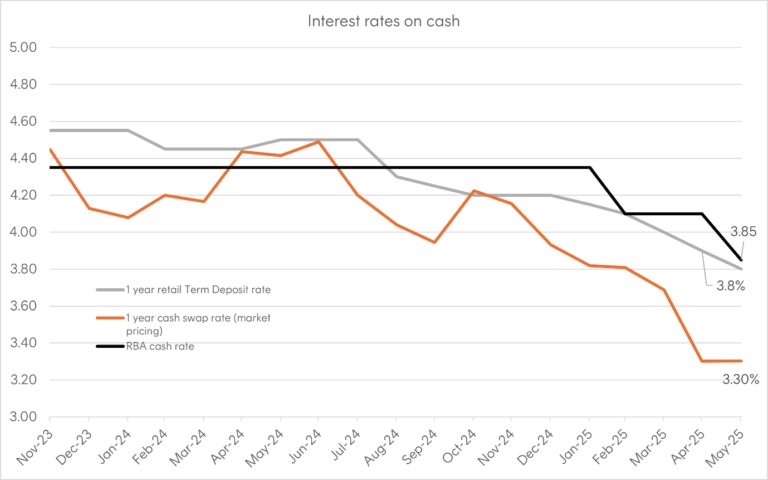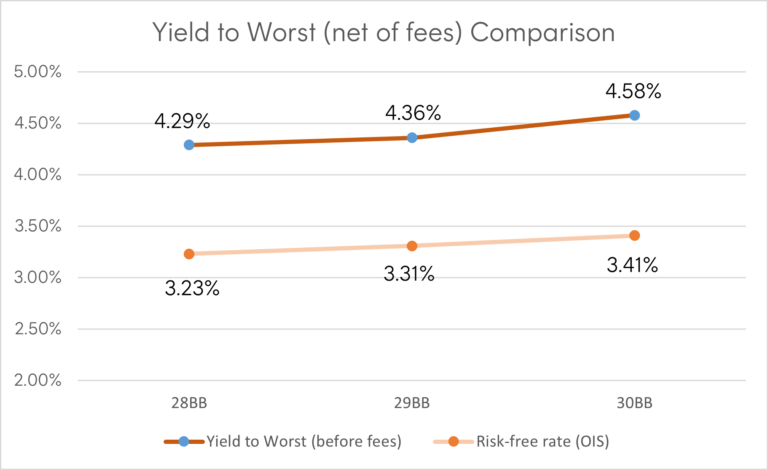Where could income-starved investors park $11 billion?
For mortgage holders, the Reserve Bank’s latest interest rate cutting cycle has likely come as a welcome relief. But for savers – particularly those who rely on term deposits for a recurring income – it’s a different story.
The Reserve Bank has already cut interest rates twice this cycle. Betashares Chief Economist David Bassanese believes we could see up to two more cuts this year and two more next year. If rate markets are right, the cash rate could fall below 3% by this time next year1.
If that plays out (even with the caveat that actual results can differ materially from forecasts), term deposit rates could fall significantly, and some individuals could miss out on a lot of money in missed interest. That said, there are options available for savers looking for investment options that provide stable income and competitive yield in a falling rate environment.
How much could be lost?
Analysis by the Betashares Fixed Income team shows that, since the start of the current RBA rate-cutting cycle, the average advertised one-year term deposit rate has already declined by 0.7 percentage points to 3.8% (as at end of May 2025).2
Term deposit rates may also decline further because both the BBSW (bank bill swap rate) and 1-year government bond yields have been declining.
Bank bill swap rates are short-term credit rates that can have an impact on both household and business loan interest rates. They can also impact the value of investments with exposures to interest rates like term deposits. The 1-year government bond yield is also a key indicator of short-term interest rates. Lower yields could indicate an increase in investors who are seeking safety in assets like term deposits – and the more demand, the less the banks have to offer in interest to entice you.
Based on where 1-year bond yields and BBSW sit today and given that term deposit rates typically lag behind both, our Fixed Income team is currently forecasting that the term deposit rate could decline another 25-50 basis points in 2025.

Source: Bloomberg, as at 31 May 2025. Yields are subject to change. Past performance is not indicative of future performance. Term deposit rates are based on RBA data3.
The cumulative impact of the first two rate cuts means that $6 billion less income will be earned over time4 (assuming your money is parked in a 12-month term deposit and rates had remained unchanged). That’s because when the RBA cuts the cash rate, the banks (who also administer the term deposits) tend to follow suit. If the RBA delivers another two to three rate cuts this cycle, as markets are forecasting, another $5 billion could be at risk5.
That could amount to $11 billion in total income disappearing from term deposit holders’ pockets in the space of 12 to 18 months. For retirees or pre-retirees, that could be a significant loss of income heading into a key period of their lives. And for investors of all ages who’ve used term deposits as a ‘safe haven’ to park their money, it raises the question: is the return still worth it?
Three potential investment options
Investors seeking some of the characteristics of a term deposit may find potential in the new Betashares Defined Income Bond ETF range - (ASX: 28BB), (ASX: 29BB) and (ASX: 30BB).
Investing in these ETFs carries five key benefits:
- Stable income – paid monthly. The Funds target fixed monthly income payments providing predictability of cash flow.6
- Competitive yield. At the time of writing, each ETF offers a yield (net of fees) higher than the Australian market’s expectations for long-term interest rates (see figure below).7

- A clear investment timeline. Each Fund has a set maturity date, just like a traditional bond.
- Diversified exposure. Each fund invests in a portfolio of Australian fixed-rate, investment-grade corporate bonds, providing diversified exposure across a range of corporate issuers.
- Daily liquidity. Investors have the flexibility and power to manage their investments at any time prior to maturity on the ASX.
A note on risk
It’s important to note that the products within the Betashares Defined Income Bond ETF range are not substitutes for term deposits. For one, term deposits receive the benefit of a government guarantee while term annuities receive the benefit of a guarantee provided by an APRA-regulated entity. An investment in a Defined Income Bond ETF provides neither of these features.
They could, however, be a suitable replacement for those seeking higher income than term deposits are offering but also understand that investing in corporate bonds comes with risks.
3 stocks mentioned
3 funds mentioned

